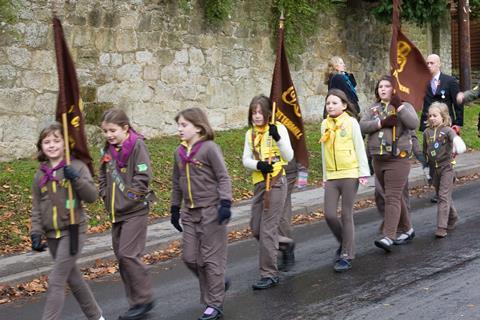Removing references to God from Brownie campfire song ‘Brownie bells’ is the latest attempt by the girlguiding movement to erase their Christian roots. Emma Fowle reflects on what that might have meant for her faith journey

I grew up in a completely unchurched home. My parents were that first generation of Brits who maybe didn’t feel the cultural pressure to attend church and so, they didn’t. Consequentially, neither did my brother and I.
When I first walked through the doors of my local parish church for an actual church service, I was wearing a little brown dress, a yellow sash and bobble hat. I had been in the building before, of course, for playgroup and the Tufty Club (a weird early 80s road safety club featuring a squirrel in yellow trousers – if you know, you know. If you don’t, feel free to google it). But I’d never been to church before.
Unexpectedly - or perhaps not, I don’t know – my walk towards Jesus began with Brownies
I was eight years old. Don’t ask me to articulate what it was that drew me in, because I really couldn’t tell you. It was an unremarkable, post-war Anglican church in the Essex suburbs. Everything about it was ordinary. There was a small choir, wearing unattractive polyester maroon and black robes. We sang a few hymns from a musty-smelling book.
There was a cardboard leaflet that I struggled to follow, unsure of when to sit and stand, when to join in and when to listen. I didn’t understand half the words of the Creed and I had no idea what a Collect, a Confessional prayer or the “one, holy, catholic, and apostolic Church” was.
A deeper love
But something in me loved being there. As an adult, looking back with the hindsight of over three decades of walking with Jesus, I might say that it is what the Bible means when it says: “deep calls to deep” (Psalm 42:7). God spoke to something deep inside me, something I did not know was there and could not have said I was looking for. It was unexplainable, unsophisticated, and beautiful.
I went home from my first church parade and asked my mum if she’d take me back the following Sunday. My dad scoffed, but mum was more open. “Yes,” she said. “I’ll come back with you next week.” Later, as I learned more, I asked more questions: Why wasn’t I christened as a baby? Were we Christians? Could I still be christened, even now please?
In the end, I was christened for my ninth birthday. I know, I was an odd child. My brother, who is three years younger and whose birthday is a week after mine, was christened for his sixth birthday. I am sure he’d have preferred a Castle Greyskull or something (again, look it up) but there you go.
An unexpected journey
Unexpectedly - or perhaps not, I don’t know - my walk towards Jesus began with Brownies. Without mandatory attendance at Church Parade services at the church next to the hall where we met each week, who knows where – or whether – I would ever have met God.
I kept going to church, was confirmed when I was twelve, and so began a journey that would ultimately lead to the salvation of my whole family (it’s a long story, you can read part of it here).
The Scouts and Girlguiding movements (which include Cubs, Brownies, Rainbows, Beavers, Explorers, Ventures, Squirrels and who knows how many others) have a rich Christian heritage. The faith of their founders, Robert Baden-Powell and his sister Agnes, had a huge influence on their decision to set up an organisation which would promote “the development of the whole person, including spiritual, moral, physical, mental, social, intellectual and emotional aspects.”
Over the past ten years, these spiritual elements have been eroded. Attendance at church parade is no longer compulsory. The words of the girlguiding pledge no longer include a promise to God, but to “do my best, to be true to myself”.
God spoke to something deep inside me. It was unexplainable, unsophisticated, and beautiful
Of course, in a diverse society of many faiths and none, there are no easy answers here. I loved Brownies, Guides and Rangers, staying in my local unit until I went to university, taking badges, leading camps and completing my Duke of Edinburgh award.
I would want as many girls as possible to have access to what some have described as “the ultimate feminist organisation”. If making it exclusively Christian prevents some girls from attending – especially those from more socially isolated communities where the values of female independence may not be championed – that would be a real shame.
But so would removing its links with the Church altogether. Who knows where my family may be if that had been the case back in 1985.






































No comments yet